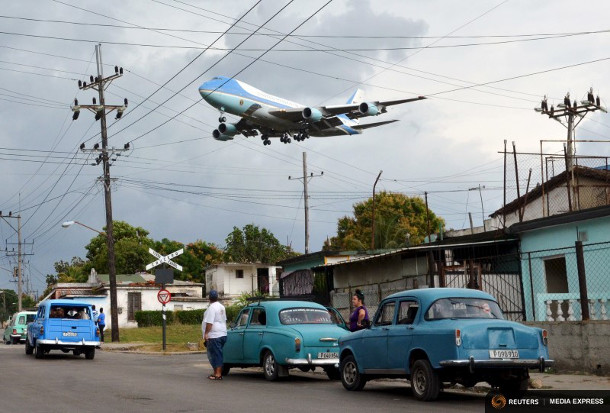One Reuters photo has won widespread admiration for summing up the new relationship between the United States and Cuba. It shows Air Force One descending over a Havana neighbourhood whose residents stand by their ancient cars, looking up at the physical symbol of their once and future overlords. It fills me with dread.
I go back a long way with the Cuban revolution. In the summer of 1957, I mentioned Fidel Castro to one of the Hollywood screenwriters exiled to Mexico City for his politics. My only information about Castro came from the Time magazines that I devoured in that pre-Internet age. Time thought he was a romantic, bearded rebel fighting for justice in Cuba's mountains.
"They'll never let him get into power," the screenwriter told me. He had already excused himself from further support of Soviet communism after Nikita Khrushchev's devastating 1956 speech about Stalin's crimes. But he had no illusions about his fellow Americans. After all, the CIA had recently removed elected governments in Iran and Guatemala, setting Iran on a course toward theocratic dictatorship and toppling Guatemala into decades of torture, repression, and genocide against the Maya.
A year and a half later, however, Castro proved the screenwriter wrong by taking Havana. In the spring of 1959, I caught a glimpse of Castro himself on the campus of Columbia University. Thousands of us young Ivy Leaguers had gathered on a sunny afternoon to see and cheer the new rebel, still the bearded romantic in fatigues, who waved to us from the far side of the campus before vanishing into the School of Journalism.
Not long after, one of my brothers arrived in Cuba to teach for a few months as a member of the Conrado Benítez Brigade, which taught over 700,000 Cubans how to read and write. I envied him.
A lesson unlearned
Castro's moment of American admiration soon ended, and two years later the Bay of Pigs invasion taught the Americans a lesson they refused to learn: You shouldn't bully other countries just because you're a superpower. Vietnam and Iraq have offered intense remedial teaching in this subject, but the student shows little improvement.
So for over half a century, American foreign policy toward Cuba has had the sophistication and nuance of a high-school clique freezing out some new kid with a mind of her own. That got us a near-death experience in the Cuban missile crisis of 1962 (Cuba's Russian pals weren't too nuanced themselves), and the Americans had to content themselves with endless assassination attempts against Fidel Castro.
Castro survived them all. Since Eisenhower in 1959, he has seen off 10 American presidents who all wished him ill, and he has retired undefeated. Only the eleventh, Barack Obama, has called bullshit on 55 years of American policy and got a dialogue going with Havana. Even then, Obama waited until the last year of his second term, when he had nothing to lose.
This is not to say Cuban communism has been vindicated. Fidel and now his brother Raúl have kept going by exporting whatever was in demand: first sugar to the Soviet Union, then soldiers to the wars in southern Africa, and now doctors to Third World countries. Meanwhile, Cuba's own infrastructure has famously decayed.
No vindication for Cuba
Ironically, Cuban doctors have done wonders fighting the cholera outbreak in Haiti since 2010 -- but when some of them brought the disease home, the government refused to admit it. Nor has the country been open about its problems with dengue, chikungunya, and now Zika virus, which arrived just in time to welcome the hordes of American tourists who will soon crowd out the Canadians.
Like soccer drama queens taking a dive and writhing on the pitch, the Cubans have also made a meal out of the American boycott, when the rest of the world (including Canada) was perfectly willing to trade with them. Being out of the American loop has even had its advantages: Havana is now an open-air museum of classic American cars, and the taste of an illicit Havana cigar has thrilled many a rich American on his way to the cancer clinic.
But I can also see Obama's arrival in Havana as American revenge, a dish best enjoyed very cold. Cuba's communism survived because Fidel and Raúl were better politicians than either their Soviet patrons or their Yankee enemies -- not because communism had anything much going for it. And now it has run out of ideas.
If the Cuban government can emulate China rather than the USSR, turning itself into another Third World sweatshop cranking out cheap stuff for the Americans, it just might hang on to some kind of power. Otherwise, Cuba will be like France after the fall of Napoleon, when the House of Bourbon came back and revoked the Revolution that had ousted it.
Air Force One, according to a story in The Guardian, descended into Havana "like a chariot of hope," as if the Cubans hoped for nothing more than more consumer goods, tidier suburbs, and newer cars. What the writer didn't notice was that the neighbourhood below was a lot tidier than many North American communities such as Flint, Michigan, and Attawapiskat, Ontario.
Hope is an easy sell, as both Barack Obama and Justin Trudeau have shown. Delivering on that hope is likely to be far harder. ![]()
Read more: Rights + Justice
















Tyee Commenting Guidelines
Comments that violate guidelines risk being deleted, and violations may result in a temporary or permanent user ban. Maintain the spirit of good conversation to stay in the discussion.
*Please note The Tyee is not a forum for spreading misinformation about COVID-19, denying its existence or minimizing its risk to public health.
Do:
Do not: